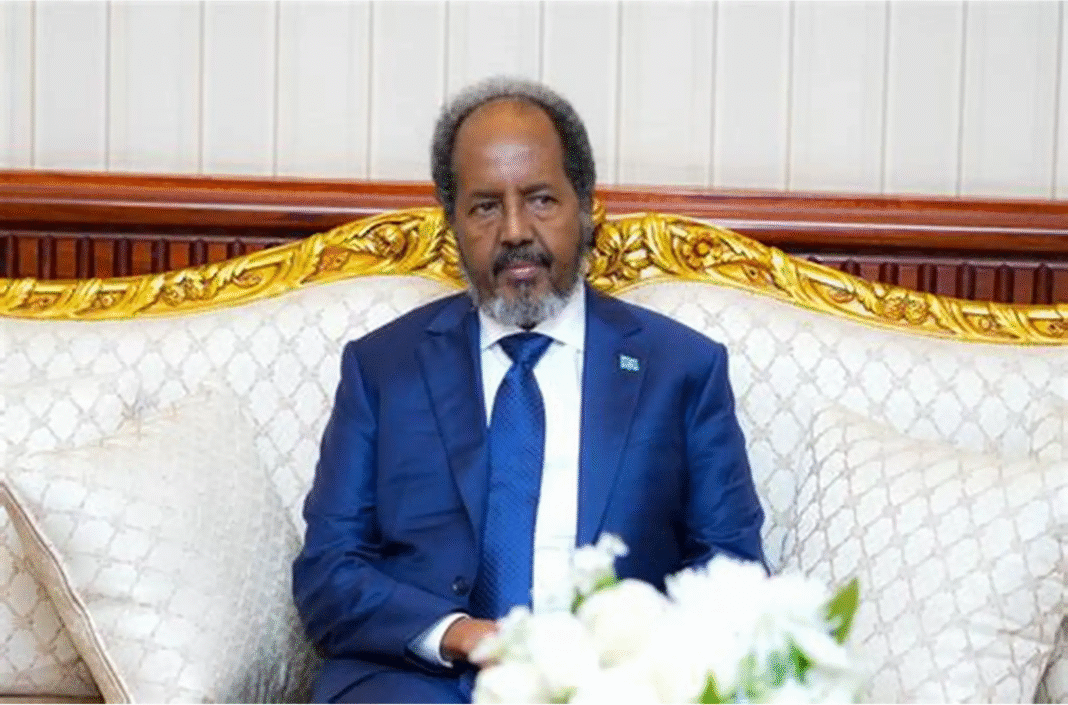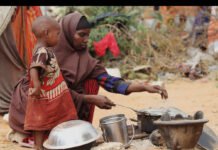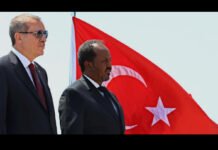By Horn Africa News Staff
Mogadishu — Somalia’s federal government is renewing its push to implement direct elections in the country by the end of 2026, seeking to end the long-standing clan-based electoral system that has dominated Somali politics for decades. But while the government touts recent constitutional changes as a pathway to democratic reform, opposition voices are raising red flags—claiming the process lacks consensus and transparency.
In a briefing this week in Mogadishu, three senior Somali cabinet ministers addressed members of the diplomatic corps and international partners to reaffirm the government’s commitment to holding “one person, one vote” elections. Interior Minister Ali Yusuf Ali ‘Hosh’, Justice Minister Hassan Moallim, and Education Minister Farah Sheikh Abdulkadir made the case for moving beyond the indirect, clan-influenced system that has fueled political gridlock and instability.
“Somalia is ready to embrace full democracy,” Minister Hosh declared during the meeting. “The people deserve a voice, and we are laying the foundation for inclusive, direct elections that reflect the will of every citizen—not the will of a few clan elders.”
Constitutional Overhaul Sparks Debate
The push comes on the heels of sweeping constitutional amendments passed earlier this year by the Federal Parliament—reforms the government says are essential to transitioning Somalia from a fragile state to a fully functioning democracy. The amendments include provisions for presidential elections through direct voting, standardized terms for government institutions, and centralized control over national security and education systems.
While government officials insist these changes provide legal clarity and a roadmap for electoral reform, opposition groups and some federal member states have criticized the process as rushed and politically motivated.
“The amendments were passed without full consultation with stakeholders,” said Abdirahman Abdishakur, a prominent opposition leader and former presidential candidate. “Without a genuine national dialogue, these reforms will deepen division rather than heal it.”
Clan-Based Politics Still Casts a Long Shadow
Somalia’s existing electoral model, often described as the “4.5 system,” allocates parliamentary seats according to clan representation—a formula devised during the country’s early attempts at post-civil war stabilization. While it was initially seen as a practical solution in the absence of functioning institutions, critics argue that it perpetuates corruption, marginalizes minorities, and undermines national identity.
Efforts to move away from this system have been announced multiple times over the past decade, yet delays, security concerns, and political disputes have derailed implementation. This week’s renewed pledge for direct elections in 2026 is the latest in a series of promises, raising skepticism among both domestic observers and Somalia’s international partners.
“There is a credibility issue,” said a senior Western diplomat in Mogadishu who asked not to be named. “Every few years we hear about direct elections, but the process remains stuck in elite deals. We need to see concrete timelines, a functioning electoral commission, and a genuine public dialogue.”
International Backing, Conditional Support
Somalia’s international donors, including the United Nations, African Union, European Union, and the United States, have long supported democratization as key to long-term stability. But their support now hinges on transparency and inclusivity.
In a joint statement released after the Mogadishu meeting, several embassies welcomed the government’s stated goal of direct elections but urged it to ensure that all political actors, including opposition leaders, civil society, and regional authorities, are meaningfully involved in the process.
Challenges Ahead
With elections set for late 2026, Somalia faces a tight and uncertain timeline. The country continues to battle security threats from al-Shabaab insurgents, inter-clan rivalries, and weak institutional capacity—all of which pose serious obstacles to organizing credible nationwide polls.
“Building trust in the process is as important as the process itself,” said Somali analyst Isha Mohamud of the Heritage Institute for Policy Studies. “Without widespread buy-in, even a technically sound election could lead to greater instability.”
For now, the federal government is betting on its constitutional reforms to serve as the backbone of a new political era. Whether the promise of direct voting will finally be realized—or again deferred—may depend on how inclusive the journey becomes.





